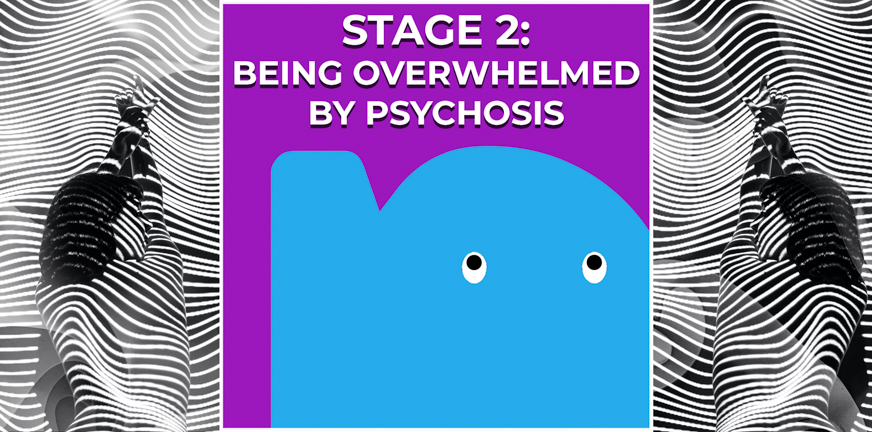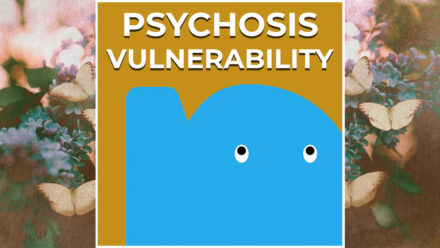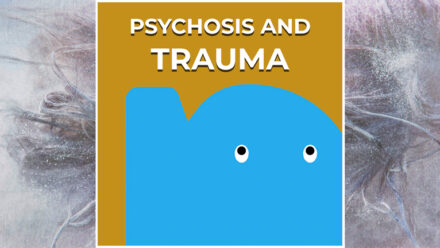
Sometimes the early symptoms can become so intense that they develop into a psychotic episode. This stage often begins with a confrontation or conflict. For instance: someone is in a manic stage and tries to convince the mayor to let him run the city. Or a boy is removing all electronic devices from his house because he thinks they are controlling his thoughts. Or a girl is upset because Facebook has been spreading secret messages about her.
Living in your own inner world
During this stage, you are overwhelmed by the symptoms of psychosis and confused about what is real or not. You are completely absorbed in your own inner world. This has disrupted contact with other people. Usually, you cannot function any more and need immediate care, although you don’t realise this. During this stage you are unable to distance yourself from your experiences: you are starting to see them as part of who you are. It is (nearly) impossible to stop or control your thoughts, mood and behaviour.
Losing control of your life
Control of your life is slipping away and your delusions and/or hallucinations make you lose your sense of ‘shared reality’. Because you are experiencing a different world, in which people appear to be acting differently, people around you find it very hard to reach and support you. It is important to get the right kind of care as quickly as possible at this point. The people around you play an important role. Well-meant help could lead to you getting the right kind of support quickly. But sometimes help can also make the crisis worse, especially when you think you do not need any help at all.
People around you may not understand
This stage of being overwhelmed by your psychosis often leads to confrontations with other people. It is likely that a crisis situation occurs. Your behaviour is getting somewhat out of hand and you have become overwhelmed by multiple symptoms. You can no longer explain to others where your thoughts and feelings are coming from. People around you can´t make sense of what you are saying any more. They do want to help or take action, but don’t know how.
You have lost touch with ‘shared reality’ and the people around you do not follow your train of thought any more. This is causing a lot of anxiety, panic, powerlessness, lack of understanding and stress, both for you and the people who care for you. Tensions are rising. In the logic of a delusional system, you may develop behaviour that may be seen as dangerous, resulting in people saying you are a danger to yourself and others.
Common symptoms of psychosis
- Your emotions are very strong and extreme:
- You are feeling a lot of anxiety;
- You are angry at the people around you;
- You are feeling stressed.
- You have less self-control and are displaying unusual behaviour:
- You are extremely up-beat and hyperactive: you don´t need any sleep;
- You have unwanted, extreme or bizarre thoughts
- You think external forces or powers are influencing you;
- It is difficult for you to put things in the right context.
- You are hypersensitive;
- You have concentration and motivation problems;
- You are hearing voices, and/or seeing, feeling, tasting or smelling things other people do not perceive;
- You are hallucinating;
- You are suspicious and distrusting;
- You think people are watching you or spying on you (suspicious delusions);
- You feel like you are being controlled;
- You are seeing conspiracies, where you think you are being followed (persecutory delusions);
- You think newspapers, radio, TV and other people are talking about you (referential delusions);
- You think other people can hear or control your thoughts.
- You are so down you can’t see a future for yourself anymore;
- You think the world is ending or that you must save the world;
- You are having strong spiritual experiences.
Relation between anxiety, depression and psychosis
Marked depressive and manic symptoms often go together with the development of a psychotic episode. So there is a relation between anxiety, depression and psychosis. From a severe depression, or lots of anxiety, a psychotic episode can develop. And the other way round: a psychotic episode can also be followed by strong feelings of anxiety or depression.
Progression of this stage
The speed of recovery from an acute psychosis depends on many different factors:
- The intensity of the psychosis itself;
- The natural variation between people, such as differences in:
- Physical health;
- Personal resources;
- Personality;
- Mental resilience;
- Having other (psychological) vulnerabilities;
- Having hope and perspective for the future.
- The use of substances such as drugs and alcohol;
- How well you are taking care of yourself:
- How much sleep you are getting;
- Having a balanced daily routine or not.
- How healthy your environment is:
- The stress you are under;
- How quickly you can get back to work;
- The relations with your relatives, partner, family and friends;
- How much support you are getting from your social network and people around you.
- The effectiveness of your treatment
- Whether medication works for you;
- The therapeutic relationship with your care worker(s)
Adjusting course
When someone around you is psychotic, it is necessary for you to adjust course to prevent a crisis. Seeking professional help and staying close is very important, so that others can temporarily take control of the situation. At this stage, medication can help relieve the symptoms of psychosis quicker, to get to calmer waters.
With the right support, the psychotic episode becomes less overwhelming after a while. For some it is a matter of hours, for others it lasts for weeks or even months. But eventually, the intense psychotic experiences will fade into the background again.
When this overwhelming phase has passed, the has come to recover and process everything that has happened. We describe this in the next stage: ‘Struggling with psychosis vulnerability’.
Example
A student is having suspicious thoughts from time to time. During a busy exam period, and after restless nights of studying, suddenly he finds himself in an openly accusatory mode in the assembly hall. He accuses a teacher of reading his mind. His confused behaviour leads to an argument between him and a group of fellow students. Things get out of hand and people call the police. The police soon ask the assistance of health care workers.




